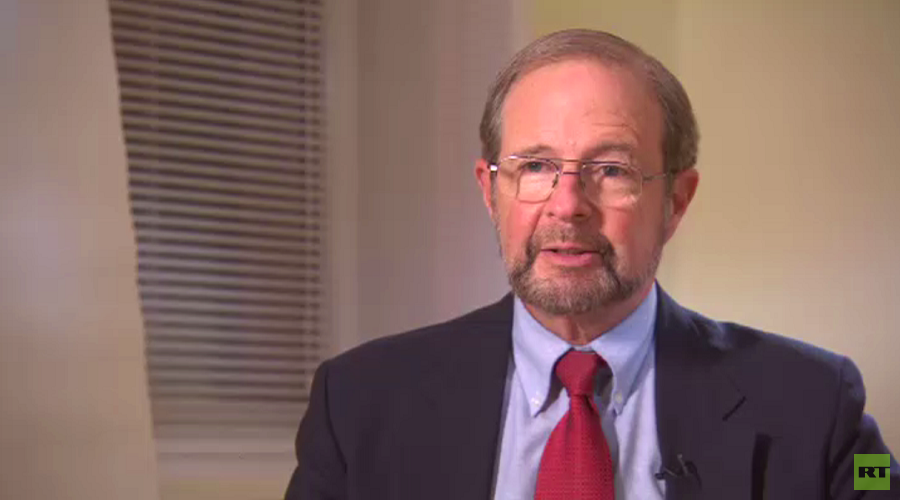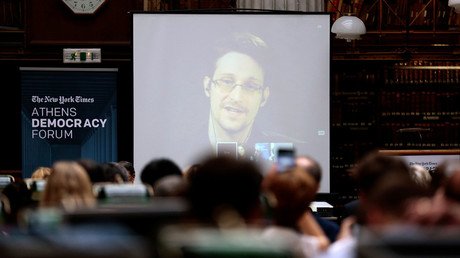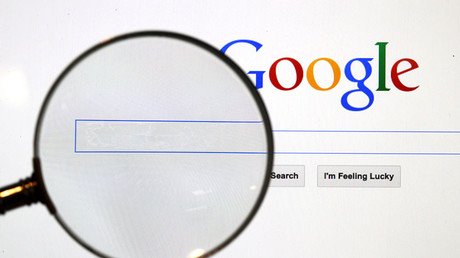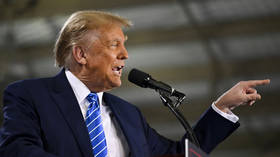‘Google has power to control elections, can shift millions of votes to Clinton’ – Robert Epstein
People trust the “unbiased” internet search giant Google so much it can actually influence up to 10 million undecided voters to choose Hillary Clinton for president, prominent US psychologist and author Robert Epstein told RT following years of research.
Despite being a supporter of the Democratic presidential nominee, Dr. Epstein believes Google’s unchecked algorithm of placing one candidate over the other in search results constitutes a “threat to democracy.”
RT: Robert, how did you discover that Google is possibly in cahoots with the Clinton campaign?
RE: Well I didn’t find out that they were necessarily supporting Hillary Clinton, that’s not what I found at first. First, through several years of research, I found that they had the power to control elections, the power to shift the votes. So, that was more than four years of experimental research with more than 10,000 people in 39 countries.
So, we established through some very careful experiments that by favoring one candidate in search rankings Google can shift a lot of votes. More than 20 percent of undecided voters overall, and in some demographic groups up to 80 percent of undecided voters. People trust search rankings so much that if one candidate is favored in search rankings that shifts peoples’ votes.
Now, more recently, many people have established that Google has a very close relationship with Hillary Clinton. That didn’t come from my research, that came from all kinds of investigative research by many people.

RT: Are you going to take a look at Facebook and Twitter as well? It looks like social media play an even bigger role in the elections than televised debates.
RE: Well, we know now that Facebook has the power to shift about 600,000 votes to Hillary Clinton on Election Day with no one knowing this is occurring. All they have to do is send out “Go out and vote” reminders to Hillary Clinton’s supporters, but not to Trump’s supporters. That would cause a lot of people to vote who would otherwise stay home. So yes, we’ve looked at Facebook, we’ve looked at Twitter. But again, Facebook can shift 600,000 votes, Google can shift somewhere between 2.6 and 10.4 million votes.
RT: Have you been able to find abnormal search results by Google in some other countries intended to influence the outcome of elections?
RE: We haven’t look carefully at too many countries. We’ve looked at the UK election in 2015, we looked at the national election in India, at the Lok Sabha election in 2014. What we do know is that it is the nature of Google’s algorithm to put one candidate ahead of another. That happens automatically. That happens, as Google would say, organically. So, this means that Google’s algorithm has probably been determining the outcomes of close elections around the world for many years, probably actually controlling the winner in as many as 25 percent of the national elections of the world.
RT: What do you think about this threat of big data? Do you think Google and other search engines analyses all search results by an individual for a good purpose?
RE: Well, big data at the moment is a threat. It’s a threat to democracy, at least as we have it in the United States, it’s a threat to human freedom, it’s a threat to civil liberties. This is mainly because the technologies are very new, and new means of control, of surveillance, of manipulation are being developed which at the moment are not regulated – they’re not covered by any laws or regulations. So, the problem is that these technologies have developed quickly, and we have not developed systems for monitoring these technologies, we’ve not developed systems for regulating these technologies. Obviously, we must do so.
RT: You’ve said that unlike Europe, Russia and China were able to overcome the Google monopoly, but a lot of people are still using this search engine. Do you think that the US company can manipulate public opinion in Russia as well?
RE: Well, it’s hard for them to manipulate opinion if they don’t dominate that country. Google dominates most of the countries in the world. The only countries it doesn’t dominate are Russia and China. So, Russia and China are protected a little bit from Google, but Russia and China have their own problems. Russia has Yandex, China has Baidu, and these companies can use techniques just as the ones that Google is using and perhaps they’re already using these techniques. These techniques can be used by any big tech company that provides a search engine. These techniques can be used by any big tech company that provides search suggestions.
My newest research shows, for example, that Google seems to be favoring Hillary Clinton in its search suggestions, the suggestions it gives you when you first start to type an item, and from new research I’ve done, we know that if you suppress negative search suggestions from one candidate, that shifts votes and opinions towards that candidate. So, Google is not the only problem. Any of these big tech companies can use these techniques for surveillance, for manipulation, for control, and I think we have to be concerned about the big tech industries in general around the world, not just Google.
RT: How do you oppose such great power being wielded by one corporation like Google?
RE: Well, the problem with a lot of power being in the hands of one company is that the private company is not answerable to the public. The private company does not have people who we voted on. The private company might be run almost like a monarchy, with the CEO having enormous power and the public having no say whatsoever in what they do, even not having access to their internal records. So we would have no idea of exactly what they’re doing or how they’re doing it and how they’re making decisions. This is potentially very dangerous. The situation right now is unprecedented in human history. There has never been so much power placed in the hands of so few people who are beyond the reach of any laws, beyond the reach of any regulations, and who don’t necessarily have the public interest in mind.
RT: What about Donald Trump? In your opinion, what methods and tricks has Donald Trump and his loyal media used in this presidential race?
RE: Well, I’ve said in writing, repeatedly and in many interviews that I’m a very strong supporter of Hillary Clinton. Hillary Clinton is by far the better candidate, Donald Trump is a very weak candidate, he would not make a good leader, he would not make a good president. Plus, I know people in his family, it makes no sense to me that he is even running for president, I don’t think he wants to be president! I think he just wants to increase his celebrity so that he can start his own television network, and I think that steps are now already being taken for him to do that.
The private company might be run almost like a monarchy, with the CEO having enormous power and the public having no say whatsoever in what they do, even not having access to their internal records. So we would have no idea of exactly what they’re doing or how they’re doing it and how they’re making decisions. This is potentially very dangerous.
I made a prediction on Twitter recently, you can check this: I not only have predicted that he will set up his own television network but that he will launch his network with a guaranteed hit show. It will be a reality TV show about Donald Trump running for president, and that will be a hit show, so I think that’s his only interest here. Hillary Clinton will become our next president, it’s guaranteed and in my opinion Donald Trump has no interest, never had any interest in becoming president.
RT: Do you believe that Hillary Clinton will become US president through the manipulation of public opinion?
RE: Oh, Hillary Clinton is guaranteed to win this election, and I have said previously based on polls that seem to show a kind of a close vote, that those polls did not take into account the power that Google and other companies have to shift votes. That’s missing from these polls. So, once you realize the power that these companies have, Hillary Clinton is absolutely guaranteed to win, and she will win in the margin of somewhere between 2.6 million and 10 million votes. If we take the mean, the average of those two numbers, I guess you could say it’s pretty clear that she will win by approximately 6.5 million votes.
READ MORE: Hearts & minds: Google-run project to tackle ISIS propaganda, target US far right
RT: Given that the United States has such an expensive and powerful media industry, would you say that voters in the US have a real picture of the presidential campaign?
RE: Well, voters in the United States I think do get a pretty good picture because we have so many different kinds of media and people are just bombarded with information from newspapers, magazines and the internet, more than 400 different television channels. So I think we do get a pretty complex and deep picture of things, but you have to remember that all of these forms of media are competitive. So, we’re getting one perspective from one magazine, another perspective from another magazine.
But when you come to something like Google, there’s no competition. There’s no competitor. It’s a completely different kind of influence, it’s non-competitive. In other words, if you’re still trying to make up your mind and you go to Google and ask a question about the candidates or about some sort of issue related to the election, Google will show you whatever it wants to show you and that can easily, easily tip your opinion one way or the other and there’s no competitor, there’s no way for anyone to compensate what Google just told you.
So, this is a completely new and very dangerous kind of influence. It has no competition, there’s no corrective for it, and people trust Google – we know this from surveys – people trust Google more than they trust any newspaper, any magazine or any television station. People trust information that they get from a computer much more than information they’re getting from television or a newspaper because they know that television and newspapers are biased, because they know that people are actually giving them the information. But when they get information out of a computer they mistakenly believe that that information is impartial, that information is objective and of course, that’s not really true, but that’s what people believe.
The statements, views and opinions expressed in this column are solely those of the author and do not necessarily represent those of RT.
















